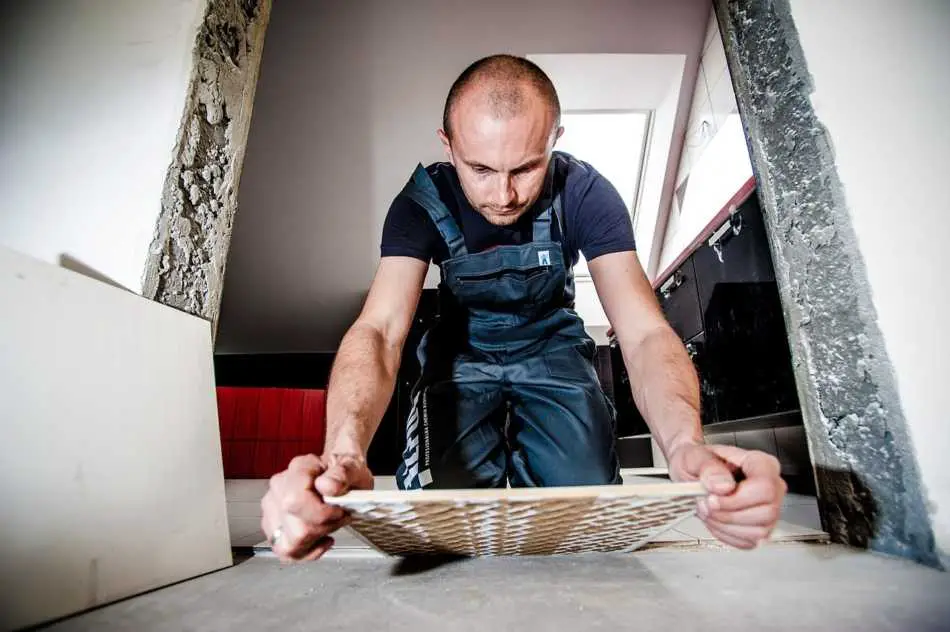Using mortar to set tile on floors and walls is fine, but what glue will stick to ceramic tiles when you want to bond them to something else? Because one side is often smooth, finding the right adhesive can be difficult. Too little hold, and it will pop right off, but the wrong chemicals can damage your tiles. It’s crucial to use the right tool for every job. When that job involves a smooth surface like tile, bad glue could leave you with broken tile, but it won’t get you the results you want. Instead of playing guessing games and potentially damaging your tile or other things in the process, it would be best if you used epoxy-based glue. While these used to be difficult to find, they’re a couple of clicks away on the internet these days. I will share my favorites and some tips on how to get the bond you need with any ceramic tile.
What glue will stick to ceramic tile? E-6000 will stick to ceramic tiles. However, if you don’t have this perfect bonding agent around, there are several other options, such as super glue and liquid nails. That said, keep a tube of e-6000 on hand for ceramic whenever possible, but it’s useful to know other glues will also hold in a pinch.
What Is The Best Adhesive For Tile On Tile
Choosing the right glue that will stick to ceramic tile is more than finding something that will hold for a minute. There are quite a few different options, and some are only temporary. Almost any adhesive that sticks to ceramic will work to glue it to another piece of ceramic. However, that doesn’t mean it will last.
Where and why, you need to stick two ceramic pieces together will determine which is the best option. For example, a broken ceramic cup is different from a bathroom floor. Likewise, dryer areas don’t need the same type of glue that a damp place like your bathroom requires.
Tile Over Tile In Bathrooms
It is better to remove existing tiles before placing a new layer. However, if you are going to put new tiles over old, existing tiles in a bathroom, you need to consider moisture. Regular glue or dry-place adhesives won’t work here.
Instead, opt for a thin-set adhesive, aka thin-set mortar. Just like putting down a fresh layer of tiles on a new floor, this is the go-to glue for putting tile over tiles in a bathroom. Mortar is designed to dry in a manner that helps prevent moisture from getting under or between tiles. However, you will still need to make sure to seal between the tiles with grout as well.
Tile Over Tile In Kitchens And Dry Places
Unlike your bathroom, most kitchens, hallways, and other rooms are dry. However, people who live in especially damp climates may need to stick to a bathroom-type thin-set mortar. Otherwise, you’re looking for an adhesive called mastic.
All tiles, whether you use them on a wall, floor, or counter, require a flyer of grout between them. You could say grout is also the glue you need because it locks out any unwanted moisture. If you get water or other liquids under your tiles than you will have issues with mold and mildew.
Tile On Tile For Broken Pieces And Art
From small, accidental chips to whole tiled installations in frames, sticking tile to tile for more creative purposes is nothing like retiling a floor. Especially when doing repairs and creative tile, you need a good epoxy resin.
There are a lot of distinct brands of epoxy glue, but the best for crafts involving tile is e-6000. Sadly, not enough people know that the ‘e’ in this title stands for epoxy.
I suggest Amazing E-6000 Craft Adhesive from Amazon. This durable epoxy glue is not only permanent but also flexible. You can clean up easily because it is also washer safe. Learn all about e-6000 on Amazon by clicking here.
Will No Nails Stick To Ceramin Tiles
It may look like a misspelling, but Ceramin is a great alternative to stone or ceramic. Luckily, a glue that sticks to ceramic will also help you apply Ceramin. In fact, ceramin is like ceramic tile in many ways, including composition.
Ceramin provides its own adhesive for laying the tiles. However, the company recommends sealing cracks with silicone caulk. While it’s best to do the initial installation with a manufacturer-recommended adhesive, No Nails should stick to Ceramin. The finish is similar in texture, and Ceramin is a composite ceramic product.
What You Need To Know About Ceramin
Ceramin or Ceramin Vario is made in Germany. This ingenuitive tile alternative is PVC-free. Furthermore, it is also environmentally friendly, non-toxic, and recyclable. The tiles are lightweight, waterproof, and easily recoverable.
Ceramin may be new, but it is well made and extremely easy to DIY. The finished product feels like ceramic, and it slots together using a jointed system for fast installation. You’ll be surprised at how durable and easy it is to clean this unique not-ceramic. Plus, Ceramin is available in different finishes and colors to suit your decor.
Will Gorilla Glue Work On Ceramin Tile
Did you know that Gorilla Glue makes a two-part epoxy? When choosing the right glue to stick to your ceramic tiles, a standard superglue won’t work, but Gorilla Glue’s epoxy works just fine. What does that have to do with Ceramin?
Ceramin can be installed over existing tiles for a new look. Moreover, since it’s a composite that is similar to ceramic, though lighter in weight, most or all the same adhesives work on Ceramin. Unfortunately, Ceramin is new enough that not every possible combination has been tried yet.
Neither Cermin’s websites nor retailers have all the answers. That said, there’s no good reason an epoxy strong enough to bond almost anything together wouldn’t work. Skip the regular Gorilla Glues and go for the epoxy variant in the double-barrel syringe.
For your Ceramin and other ceramic tiles, Gorilla 2 Part Epoxy from Amazon will bond anything you need. This well-known and trusted brand makes lots of excellent and durable glues, but this is the one you want for ceramic tile work. Better still, it sets in five minutes for a quicker solution. To read the outstanding five-star reviews yourself, click here.
Strongest Glue For Metal To Tile
If you are a home builder or artisan, the idea of sticking metal to ceramic may be foreign to you. Knowing what glue will stick to ceramic tile is different from knowing what will bond two different substances. Fortunately, boatbuilders and many other professionals work with mixed mediums.
Like most ceramic applications, you want a good two-part epoxy. Using a resin and a hardener that mix to create a strong and durable bond works on lots of materials. Among these are ceramic and metal.
The trouble with using a non-metal-bonding agent is that heat and cold cause expansion and shrinkage. Some adhesives have no ability to stretch with the changes. When this happens, the metal moves, but the glue stays put and breaks off.
Although you can use drilled holes and other damaging, invasive methods, a smooth finish is preferable. Moreover, drilling into ceramic is dicey, and it can leave you with cracked or broken pieces. A two-part epoxy adhesive will give you a near-unbreakable bond between these two very different materials. Most importantly, it will let the materials expand and contract without breaking.
Though there I a plethora of options, it’s always better to go with a trusted brand. Choose a well-known company with a history of use in locking down metal as well as ceramic parts. Surprisingly, boat repair adhesives are great for this type of job. Plus, they’re usually waterproof.
For an exceptional bond between metals and ceramic, check out Epoxy Adhesive C-Tough by Cec Corp. This rugged, two-part glue is so good at holding things together it’s used in boat building and knifemaking. With flexible structural binding, your metal and tile will stick together even when the temperatures change. Heat and cold can cause rapid expansion, even in metals. Plus, you get thirty to forty minutes of working time before it dries so that you can do more complex projects. Have Amazon ship C-Tough to your door when you click right here.
Final Thoughts
You can use epoxy-based glues for more than merely sticking things to ceramic tiles. Tile repairs are also easy with this type of glue. Use a thin layer and stick broken ceramic to itself with no trouble. Good epoxy glue is nothing to sneeze at as they are among the most powerful options around and can sometimes bear loads over a thousand pounds. Your ceramic won’t hold up if your glue in those cases.
Please use caution and gloves when working with epoxy glues. You don’t want to bond yourself or anything else to a ceramic tile accidentally. Happily, most un-set epoxy glue is quick to clean up, so pay close attention as you work. Getting the mess before you get into a sticky situation is the key.
Epoxy glues are powerful, but they are also surprisingly versatile. You can get a rigid or flexible bond depending on which type you use and how you cure it.

